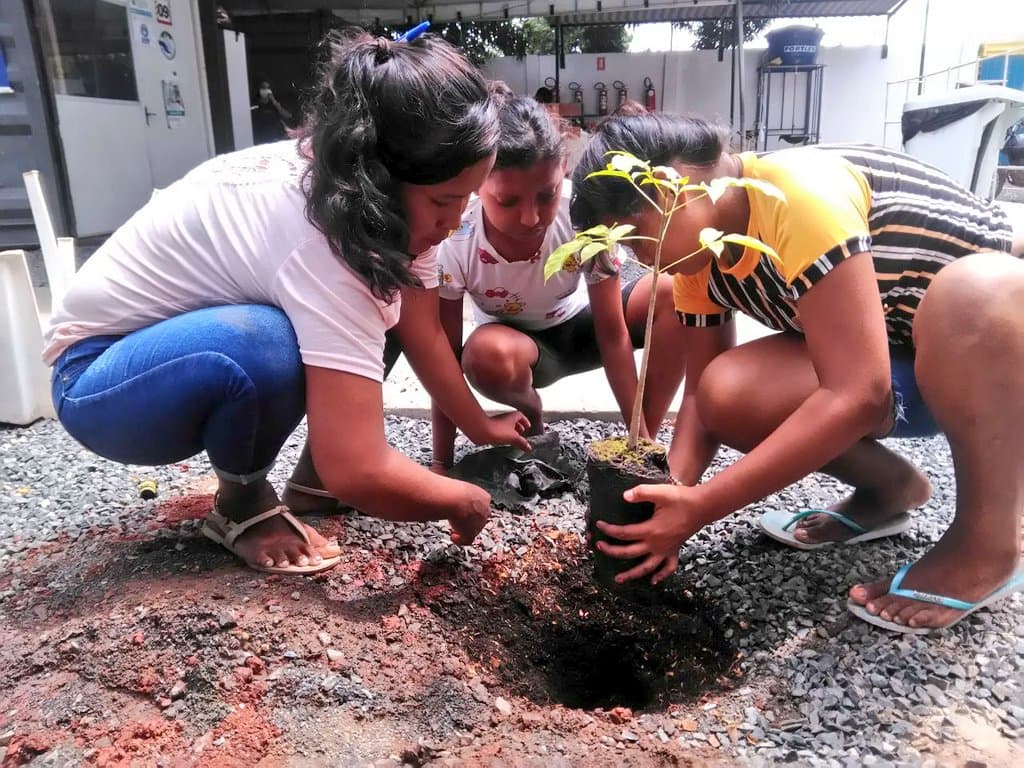The actions of human beings, their way of life and choices have a major impact on the planet’s ecosystems and significantly alter the natural environments.

Instituted by the UN, the World Environment Day is celebrated on June 5, and its aim is to awaken in everyone an awareness of the environmental problems caused by a disordered way of life, as well as to offer an opportunity for social debate in the search for adequate and restorative solutions for the preservation of the planet.
In the shelters under the management of Fraternity – International Humanitarian Federation (FIHF), in Roraima, with the support of the UN Agency for Refugees (UNHCR), there are numerous challenges facing issues which directly affect the environment, such as waste management, clean water supply, basic sanitation, and even the response to the current pandemic situation.
The infrastructure and WASH (Water, Sanitation & Hygiene) coordinator of the five shelters managed by Humanitarian Fraternity (FIHF), Civil Engineer Daniel, explains that the actions are guided byone of the principles of the Humanitarian Charter, which is “the right to life with dignity and the right to receive humanitarian assistance.”
In this way, matters related to the promotion of hygiene, water supply, trash and solid waste management, as well as the issues of disease outbreaks, are treated according to standards recommended in the Sphere Handbook, which guarantees not only an adequate reception in the shelters, but also that the established standards are effective and help to protect the environment.
Several lectures have been given, mainly regarding issues related to encouraging the promotion of good hygiene practices and according to Daniel, “community participation has been crucial for us to achieve a more efficient response.”
Consequently, many actions to raise awareness are offered to the community by the team of missionaries, volunteers and contractors present in the shelters, some of whom, with the intention of confirming and respecting the customs and culture of the sheltered indigenous people, take care of the demand of these groups, and even rely on their own experience.
Medicinal Garden
One of them include the start of the execution of a mandala garden for the cultivation of medicinal herbs, as Sister Maria de Lourdes, a monk of the Grace Mercy Order, tells us: “the project arose from the demand of the indigenous mothers themselves, who wanted access to natural medicines to be able to treat the most common health issues, such as headaches, colds, stomach or bowel problems, among others.”
This cultivation of medicinal plants is given the name of Medicinal Garden and relies on the knowledge and experience of the indigenous people; as the monk emphasizes, “one of the leaders of the shelter is knowledgeable on natural medicines and has helped a great deal with all that is related to medicinal plants.”
Also according to the monk, for the building of that garden, they rely on the Warao herbal medicine manual: Warao Medicinal Plants, by Weber Wilbert. “We are using this manual as a support, because it contains information on the Warao medicinal plants, but we adapt it according to the plants we have here in Brazil,” she explains.
Adolescents, young people and adults are participating in this activity of caring for and maintaining the mandala garden. “It is turning out very well, because everybody has become very interested in the matter, the activity has spread, and many members of other shelters are invited to participate,” adds Sister Maria de Lourdes.
Education on taking care of the environment
Some special workshops are also being offered to the shelters as a way of celebrating this environment week. One of them, held with the children, focused on raising awareness about the importance of separating the trash from recyclable materials. Another workshop offered was on the making of lemon-based natural disinfectants and detergents.
These are small incentives, simple awareness activities that, if properly applied within the refugee shelters, can help a great deal to promote the correct use of natural resources to provide for daily needs, and thus contribute to minimizing the man-made effects that cause so much damage to the environment.













